Blog
Helpful Resources for Home Owners, Home Buyers, and Realtors
The Secrets to a Great Home Inspection: What Every Homebuyer Should Know
At Western North Carolina Property Inspections LLC, we believe a great home inspection goes far beyond checking boxes. It’s about delivering clarity, peace of mind, and the knowledge you need to make confident decisions about your property. Whether you’re buying your first home or investing in your tenth, a high-quality home inspection can make or break your real estate experience.
A great inspection is about more than identifying problems—it’s about understanding the home, educating the client, and providing the tools to protect their investment. Here’s a detailed look at what makes a great home inspection and why choosing the right inspector is crucial.
Every successful inspection starts with showing up on time. Punctuality reflects professionalism and ensures that the inspector has full use of the time window to conduct a thorough and complete inspection. Prompt arrival allows us to evaluate the property’s exterior while daylight is optimal, make initial assessments, and mentally map out the flow of the inspection. It also shows the client and agent that we value their time and are serious about the process.
The average home inspection should take 3 to 4 hours, depending on the size and condition of the home. Rushed inspections lead to missed problems. We schedule ample time to examine systems thoroughly, review findings with clients, and document the property’s condition accurately. This commitment helps us provide the in-depth insights our clients rely on.
Some of the costliest issues hide in places like attics, crawlspaces, roof penetrations, and behind insulation. These areas are often ignored or inaccessible to homeowners for years. We actively seek out these locations during inspections and use specialized tools to access, illuminate, and analyze conditions that could impact long-term safety and value.
From rodent infestations in crawlspaces to water stains in attics or faulty wiring tucked behind insulation, these areas often tell the real story of the home. We don’t shy away from tight or dirty spaces—we know that what we find there may be critical.
Inspectors must understand how the home functions as a system. This includes:
Our experience in residential construction, remodeling, and maintenance gives us the unique ability to see how each system interacts with others. This knowledge allows us to pinpoint causes—not just symptoms. For example, a water stain on the ceiling may indicate roofing issues, ventilation problems, or even plumbing failures above.
Home inspectors must adapt to the needs of each property. That’s why we come prepared with tools that help us diagnose issues more accurately:
Using advanced tools ensures our findings are not just opinions—they’re backed by data.
We communicate with clients at every stage. Before the inspection, we set expectations and answer initial questions. During the inspection, we explain what we’re seeing in real time. Afterward, our reports are detailed and visual, delivered typically within 24 hours. We’re also available for follow-up calls, especially when clients need clarification for repair requests or negotiations.
Our job doesn’t end when the report is delivered. We serve as a resource for our clients and their agents long after inspection day.
One of the most valuable aspects of a home inspection is the opportunity to educate the buyer. We love when clients attend the inspection and ask questions. We explain:
An informed client is an empowered homeowner. They can budget better, prioritize repairs, and make smarter decisions.
Our inspections prioritize not only functionality but health and safety. We look for conditions that can cause physical harm or long-term health issues:
We operate under strict ethical guidelines and comply with the North Carolina Standards of Practice. We don’t upsell services, and we have no conflicts of interest.
Every home is unique. A 1920s bungalow may have different concerns than a 2020s new build. We adjust our process to match the age, materials, and condition of each home. Historic homes may require extra attention to foundations and framing, while newer homes may have cutting-edge technology or improperly installed modern systems.
We adapt to each inspection, ensuring no relevant detail is overlooked.
A great inspection isn’t complete without a great report. Our reports include:
These reports aren’t just for the buyer—they become a resource for repairs, budgeting, and homeownership for years to come.
We believe in continued education. Our inspectors regularly participate in professional development, industry conferences, and technical training. This keeps us up to date on:
By staying informed, we offer cutting-edge service to every client.
A great inspector leaves the home exactly as they found it. We use drop cloths when accessing attics, wear shoe covers, and take care not to disturb finishes or furnishings. Respecting the property and the people involved in the transaction is central to our mission.
Choosing the right inspector makes a lasting difference. It can give you peace of mind, negotiation leverage, and a roadmap for smart homeownership.
At Western North Carolina Property Inspections LLC, we approach each inspection with diligence, care, and an unwavering commitment to excellence. We serve Brevard, Hendersonville, Asheville, and the surrounding region with the professionalism your home deserves.
Let us show you the difference a great home inspection can make. Schedule your inspection today and take the next step toward peace of mind.
#HomeInspection #WNCPropertyInspections #AshevilleHomes #MoldTesting #SafeHomes #HomeInspectorHendersonville #WNCRealEstate #ThoroughInspection #TrustedInspector #NCStandardsOfPractice #HomeBuyerTips
Gutters are one of the most important yet often overlooked components of a home’s exterior. Designed to direct rainwater safely away from the building, properly functioning gutters protect your siding, foundation, crawlspace, and even the air quality inside your home. When gutters fail, they can cause a cascade of issues — some of which can become very costly. Here’s a closer look at common gutter problems and the damage they can cause if not addressed.
When gutters become clogged with leaves, twigs, and debris, they can’t effectively channel water away from your home. Instead, water spills over the edges, saturating the ground around your foundation and soaking the exterior cladding. This constant moisture exposure can lead to rot, staining, and premature deterioration of your siding materials.
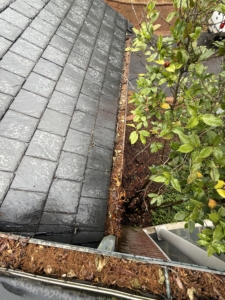
Downspouts and underground drainage pipes are essential for moving water away from the foundation. If these pipes become clogged, cracked, or collapsed, water can pool near your home, exacerbating foundation and landscaping issues. Over time, deteriorated pipes can cause erosion, basement leaks, and settlement problems.
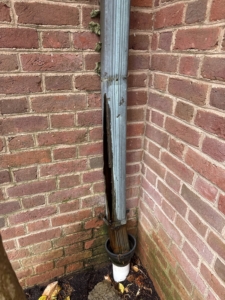
When gutters overflow, the water often runs down the side of the house, directly onto the cladding materials. Persistent water exposure can cause wood siding to rot, paint to peel, and masonry to degrade. Vinyl siding may warp, and fiber cement cladding can absorb moisture, leading to internal swelling and damage.
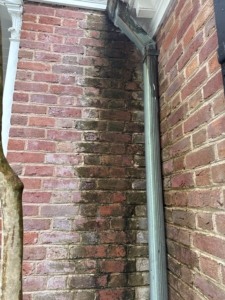
Water pooling around the foundation can easily find its way into your crawlspace. Persistent moisture in crawlspaces often leads to:
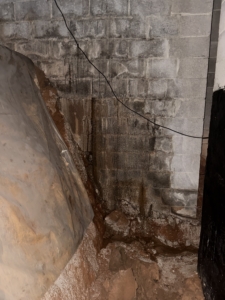
Once mold develops in the crawlspace, airborne spores can enter the living areas, degrading indoor air quality and triggering respiratory issues, allergies, and other health problems for occupants.
When moisture seeps through the cladding due to gutter overflows or drainage issues, it can penetrate the building envelope and enter wall cavities. Over time, this hidden moisture can:
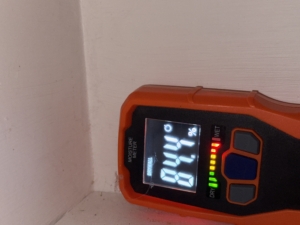
Since moisture inside wall cavities is often hidden from plain view, damage may go unnoticed until serious problems develop. Regular inspections and proactive gutter maintenance are key to preventing costly repairs and preserving the long-term health of your home.
Taking proactive steps to maintain your gutter system is one of the best investments you can make in your home’s long-term health. Ignoring gutter maintenance can lead to expensive repairs, indoor air quality problems, and even structural damage.
If you’ve noticed signs of gutter issues or water intrusion into your crawlspace, Western North Carolina Property Inspections LLC is here to help. We can assess your home’s drainage systems, identify areas of concern, and recommend solutions to protect your home from further damage. Contact us today to schedule an inspection and keep your home dry and healthy year-round.
How to Improve Indoor Air Quality During Wildfires in Western North Carolina
With wildfires affecting Western North Carolina, indoor air quality has become a major concern for homeowners. Smoke, ash, and airborne pollutants can seep into homes, creating health risks, especially for children, older adults, and those with respiratory conditions. Fortunately, there are several best practices and easy solutions to improve indoor air quality and keep your family safe during wildfire season.
If you need an immediate air quality boost, try these simple solutions:
By following these best practices, you can significantly reduce wildfire smoke exposure inside your home and create a safer environment for you and your family.
If you’re concerned about the air quality in your home and need professional guidance, Western North Carolina Property Inspections LLC can help assess ventilation, filtration systems, and potential air leaks. Contact us today to schedule an evaluation and ensure your home is as safe and healthy as possible during wildfire season.